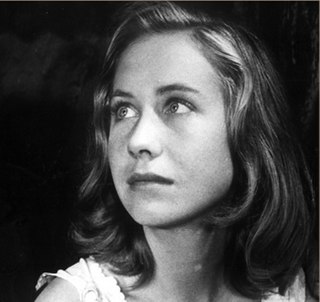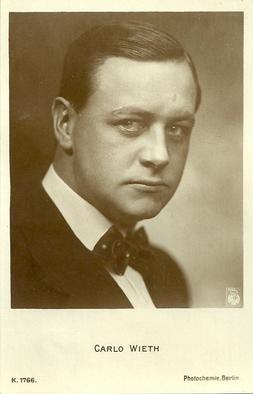Related Research Articles

Peter Malberg was a Danish actor best known for his role as Onkel Anders in the Far Til Fire movies. Peter was originally educated as a painter, but his job at Århus Theatre as a scenic painter along with the fact that his older brother Henrik was an actor, eventually led to him being in theater- and later filmindustry.

Bodil Ipsen was a Danish actress and film director, and is considered one of the great stars of Danish cinematic history. Her acting career, which began in theater and silent films, was marked by leading roles in large folk comedies and melodramas. However, it was as a director that she was most influential: directing the first Danish film noir and making several dark psychological thrillers during the 1940s and 1950s. Ipsen's name along with that of Bodil Kjer is given to Denmark's most celebrated film prize, the Bodil Award.
Henrik Malberg (1873–1958) was a Danish actor of theater and Danish cinema who played his most noted role at the age of 80—the stoic authoritative farm owner in the Carl Theodor Dreyer classic film Ordet.

Tove Maës was a Danish actress of stage, television and film best known for her starring roles in the series of "Morten Korch" films, in particular The Red Horses. Maës was a three-time recipient of the Bodil Award for Best Actress, winning in 1954, 1971, and 1983.
Emanuel Gregers was a Danish actor, screenwriter and film director. Gregers made 36 films during a career which extended over four decades from the Danish golden age of silent film until 1949. Critics often dismissed his work as dependable yet uninspired, however many of his light-hearted comedies achieved great popularity in Denmark. Gregers most notable films were romantic comedies starring his wives Bodil Ipsen and Marguerite Viby.

Viggo Lindstrøm was a Danish actor and theatre director, founder of Det Ny Teater in Copenhagen. He was married to the actress Vera Lindstrøm.
Events from the year 1874 in Denmark.

Carlo Rossini Wieth was a Danish stage and film actor whose career began at the turn of the 20th-century and lasted until his death in 1943.
Svend Kornbeck was a Danish stage and film actor.
Hans Egede Budtz was a Danish stage and film actor.

Astrid Holm was a Danish theater and film actress whose career began on the stage and in the early silent film era.
Clara Schønfeld was a Danish stage and film actress whose career spanned from the late 19th century through the 1920s.

Svend Melsing was a Danish stage and film actor, theatre director and playwright whose career spanned nearly forty years.

Gudrun Houlberg was a Danish actress who appeared in over 40 films from 1910 to 1934. She is remembered in particular for her roles in Klovnen (1917) and Grevindens ære (1919).

Marie Charlotte Wiehe-Berény was a Danish actress, ballet dancer and singer. In 1940, she received the Ingenio et arti medal.

Ingeborg Cathrine Caroline Skov (1893–1990) was a Danish actress who performed on stage as well as in a number of films. After training at Copenhagen's Dagmar Theatre, she made her stage debut there in 1911 while her first movie appearance was in 1914 in the silent film Elskovsbarnet. After marrying the theatre director Carl Thorvald Larsen in 1930, she performed a wide variety of key roles, first at the Odense Theatre until 1935 and thereafter at Copenhagen's Folketeatret until 1959. After her husband retired, she ran the Alexandra Cinema in Copenhagen.

Ellen Aggerholm née Abrahams (1882–1963) was a Danish stage and screen actress. She made her debut in Attester at Copenhagen's Folketeatret in 1901. In 1911, she moved to London where she first played Puck in Shakespeare's A Midsummer Night's Dream at Her Majesty's Theatre. She returned to Denmark when war broke out in 1914, touring with her husband's company until 1917. She then joined the Odense Theatre where she became the principal actress until 1924. She went on to tour the provinces until she performed in repertoire at the Casino Theatre in Copenhagen. After a long career, she retired from the stage in 1947. While young, Aggerholm performed a number of leading roles in mainly short silent films released by Nordisk Film from 1910 to 1915.
Aage Hertel was a Danish stage, radio and film actor whose career began in the 1890s working as a stagehand and set painter. Hertel appeared in approximately ninety films during the silent film area.
Brigitte Käthe Kolerus (1941–2001) was an Austrian-born Danish actress who performed in films and on television but mainly on stage. After studying at the Odense Teater drama school, she appeared in the musical Man of La Mancha at Ungdommens Teater in 1967 and went on to play Desdemona in Shakespeare's Othello at Det Danske Teater in 1969. She made a name for herself in films by appearing in erotic scenes in Erik Frohn Nielsen's Ekko af et skud in 1970. Kolerus also served as director of Copenhagen's Teatret ved Sorte Hest from 1978 and staged plays and operas at a number of venues.

Henri Weiss, better known as Henri Berény and also given as Henrik Berény and Henry Bereny was a Hungarian composer, violinist, pianist, conductor, screenwriter, and film director. He is best remembered as a composer of operas and operettas. The brother of composer and pianist Josef Weiss, his best known works are Lord Piccolo and Das Mädel von Montmartre, both of which were staged on Broadway and at theaters internationally.